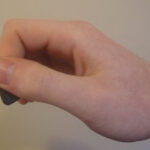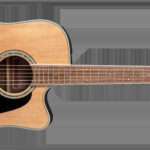Japanese guitars are rapidly becoming some of the most sought-after instruments on the market, celebrated for their cutting-edge manufacturing techniques and exceptional build quality. Following our exploration of the top guitar brands worldwide, we now turn our attention to Asia, specifically focusing on the remarkable world of Japanese Guitar Brands and what makes them so special.
In the realm of guitar manufacturing, the country of origin often serves as a significant indicator of quality. For decades, American brands such as Fender and Gibson reigned supreme, establishing iconic designs and a widespread belief that the pinnacle of guitar craftsmanship resided in the USA.
However, the landscape has shifted. Today, the phrase “Made in Japan” carries significant weight for discerning guitar buyers, signaling superior quality and craftsmanship.
[Visiting Japan? Be sure to check out Tokyo’s best guitar shops, some of which are featured on our list of the best guitar stores worldwide!]
The Rise of Quality: “Made in Japan” Guitars
While the reputation of American-made guitars has experienced some fluctuations in recent years, the prestige of Japanese-built instruments has steadily climbed since the 1970s. Renowned Japanese manufacturers like Ibanez, Fernandes Guitars, ESP, Takamine, and Yamaha have captivated contemporary musicians by prioritizing exceptional build quality and incorporating state-of-the-art, high-performance features into their instruments.
But what sparked this transformation?
The “Lawsuit Guitar” Era and the Ascent of Japanese Brands
The 1970s and early 1980s witnessed shifts within leading American guitar companies, resulting in a perceived decline in build quality and subsequent sales dips. This period coincided with Leo Fender’s sale of Fender to CBS and Gibson’s discontinuation of certain iconic models.
During this era, japanese guitar brands emerged as compelling alternatives to the American guitars that had dominated the market since the 1950s. Japanese companies, including Tokai and Ibanez, began crafting guitars inspired by popular Gibson and Fender designs, which later became known as “lawsuit guitars.”
This moniker arose because the build quality of these Japanese instruments often rivaled or even surpassed that of the Fender and Gibson guitars they emulated, all while being offered at significantly more accessible price points. This situation led Gibson to initiate lawsuits alleging copyright infringement, and prompted Fender Musical Instruments Corporation to establish its own line of guitars manufactured in Japan.
Emerging from the “lawsuit era,” these exceptional japanese guitar brands evolved into a leading creative force within the guitar industry. Brands such as Ibanez, ESP, Takamine, and Yamaha have risen to prominence as industry leaders, developing models and styles that have become classics in their own right, moving beyond mere imitation to innovation.
So, without further delay, let’s explore six of the finest japanese guitar brands available today…
Top 6 Japanese Guitar Brands
Yamaha
Yamaha stands as a flagship name among japanese guitar brands, renowned for its comprehensive range of both acoustic and electric guitars, as well as a line of outstanding portable desktop amplifiers.
Yamaha is synonymous with delivering quality instruments equipped with high-performance specifications at remarkably affordable prices.
The Yamaha Corporation’s history dates back to 1887 when Torakusu Yamaha, a passionate advocate for introducing Western musical instruments to Japan, founded the company.
Initially named Nippon Gakki, meaning Japanese Musical Instruments, Yamaha began by producing pianos and reed organs, soon expanding to include stringed instruments like violins and cellos. The company adopted the name Yamaha to commemorate its centennial anniversary.
Yamaha has earned widespread recognition for crafting high-quality, budget-friendly guitars suitable for musicians of all skill levels.
For instance, the Yamaha A-series acoustic guitars boast premium features like solid Sitka spruce tops and carefully selected tonewoods. Yamaha electric guitars, such as the Revstar and Pacifica series, offer high-performance components like locking tuners and Seymour Duncan pickups, often available for under $1000 at the time of writing.
The combination of superior components and exceptional build quality has made Yamaha guitars the preferred choice of numerous music icons, including James Taylor and Paul Simon, as well as rising modern jazz guitar virtuosos.
Takamine
While Takamine Guitars is celebrated as one of the most beloved japanese guitar brands and a leading acoustic guitar manufacturer, it was their pioneering under-saddle pickups that cemented their industry reputation.
Takamine has been crafting high-quality guitars since 1962, firmly establishing itself as one of Japan’s premier brands for acoustic instruments.
Takamine’s origins trace back to a family-operated instrument workshop that opened in 1959 at the foot of Mount Takamine.
Their initial product was a classical guitar, but they soon diversified into steel-string acoustics, introducing the groundbreaking Palathetic under-saddle pickup in 1978 and acoustic-electric guitars in 1979.
Takamine also demonstrated innovation in tonewood selection, prioritizing tonal quality over sheer volume. Utilizing a diverse range of tonewoods, including cedar, spruce, and sapele tops, paired with mahogany, rosewood, and maple sides, Takamine acoustics deliver the sonic characteristics sought after by working professionals such as Jon Bon Jovi, Garth Brooks, Bruce Springsteen, and Blake Shelton.
Fujigen Gakki (FGN Guitars)
Fujigen Gakki, now known as FGN guitars, presents a wide spectrum of high-caliber solid-body, hollow-body, acoustic, and bass guitars. They are recognized as one of the most historically significant japanese guitar brands.
Established in 1960, Fujigen was among the original “lawsuit” guitar brands, renowned for producing impeccable replicas of Gibsons and Fenders during the “lawsuit era.”
While many FGN guitars still bear a visual resemblance to Fender and Gibson models, they incorporate high-performance features while remaining considerably more affordable.
For example, Fujigen’s Neo Classic series offers LP-style features including solid mahogany bodies, flamed maple tops, Seymour Duncan pickups, and premium Gotoh hardware.
Despite their resemblance to Gibsons and Fenders, and the significant cost savings they offer, FGN guitars are by no means “cheap.”
On the contrary, Fujigen delivers quality instruments with deluxe appointments, representing exceptional value for discerning guitarists.
Yamaki
Information regarding Yamaki guitars can be scarce, yet their reputation among enthusiasts of japanese guitar brands remains outstanding, even though the brand’s parent company ceased operations in 1980.
Yamaki was known for crafting high-quality acoustic guitars that closely resembled Yamaha acoustics in design and build.
Production commenced in 1967, but by 1980, Daion (Yamaki’s parent company) went out of business, and Yamaki transitioned into a parts supplier for other guitar brands.
If you encounter a Yamaki acoustic in the used market, it’s advisable to acquire it promptly. Often available at reasonable prices, their similarity to Yamaha acoustic guitars makes them a worthwhile investment.
Tokai Guitars
Tokai is another prominent name among japanese guitar brands linked to the “lawsuit era.” However, Tokai’s build quality was so impressive that Martin Guitars contracted them to manufacture their Sigma line of acoustic guitars.
Tokai openly aimed to produce instruments of superior quality compared to the Gibson and Fender guitars that inspired their designs. For example, when Tokai introduced their line of LP-style single-cutaway guitars, they named the line “Les Paul Reborn.” These high-quality “lawsuit era” Les Paul-style guitars are now highly sought after by collectors and command prices in the thousands of dollars on the used market.
Established in 1956, Tokai continues to produce high-quality guitars, with their T-series and E-series models being particularly popular and respected.
Ibanez
Named in honor of Spanish guitar maker Salvador Ibanez, Ibanez guitars initially focused on classical guitar production but rapidly evolved into one of the world’s leading guitar manufacturers.
Another japanese guitar brand associated with the “lawsuit era,” Ibanez produced Strat and LP-style solid-body guitars that were so similar to their Gibson and Fender counterparts in appearance and construction that Ibanez was specifically named in Gibson’s lawsuit.
Since then, Ibanez has become an industry leader in electric guitars, developing some of the best-selling and most innovative models in the market. Ibanez is best known for its RG line of Superstrat guitars and is largely credited with pioneering 7-string and other extended-range guitars. Whether your musical style is jazz, rock, metal, progressive metal, or djent, Ibanez offers models tailored to the demands of your playing.
Prominent guitarists who play Ibanez include celebrated musicians across genres, from shredders like Nita Strauss, Steve Vai, and Joe Satriani, to jazz icons such as George Benson and John Scofield, and progressive instrumental innovators like Tim Henson and Yvette Young.
Final Thoughts on Japanese Guitar Brands
In conclusion, japanese guitar brands stand among the most popular and respected globally.
Industry-leading manufacturers like Yamaha, Takamine, ESP guitars, and Ibanez create high-quality instruments catering to diverse budgets and experience levels.
Regardless of your musical genre, Japanese guitar makers very likely offer the ideal instrument to complement your playing style.
And once you’ve made your choice, don’t forget to explore our curated list of essential guitar accessories to complete your setup.


